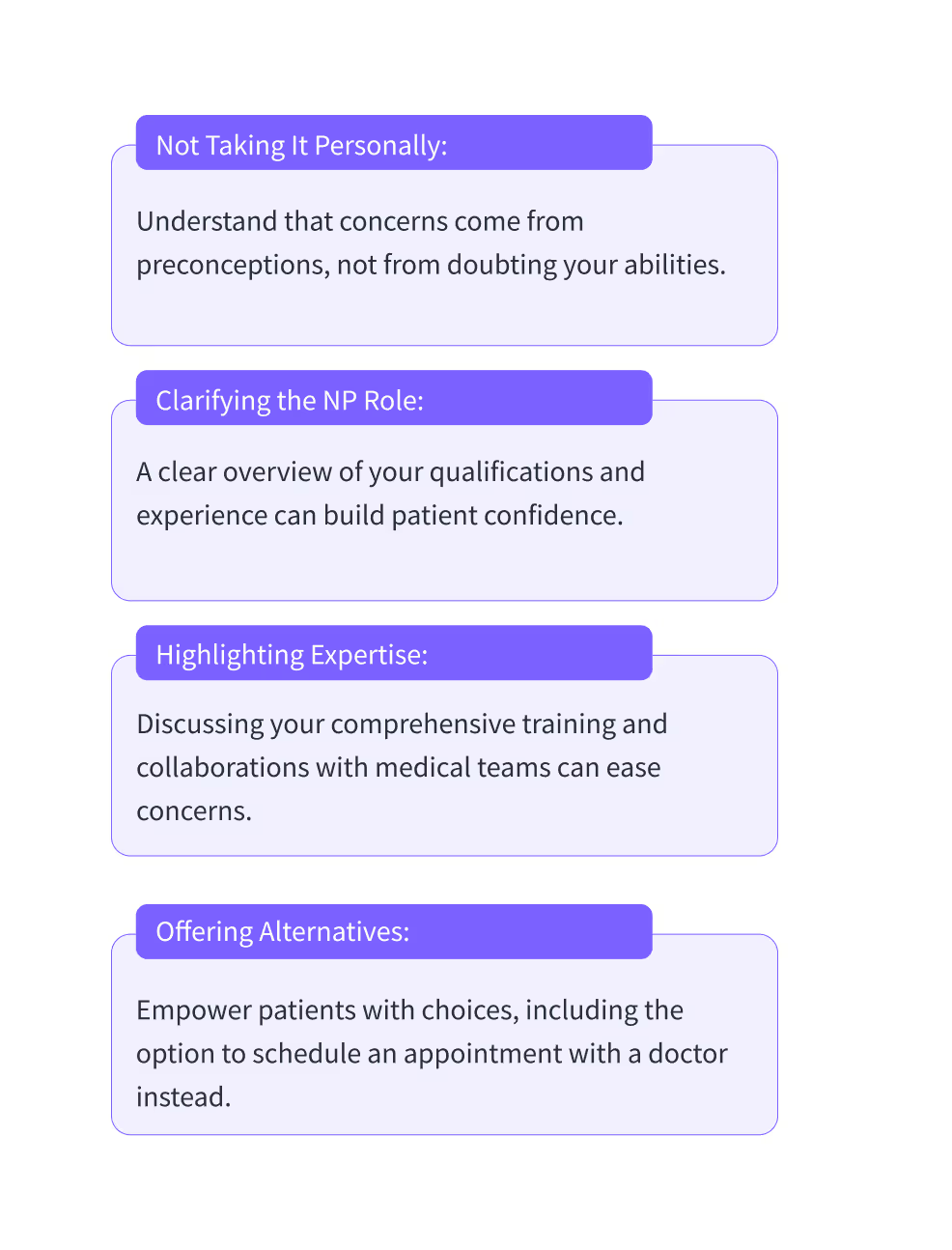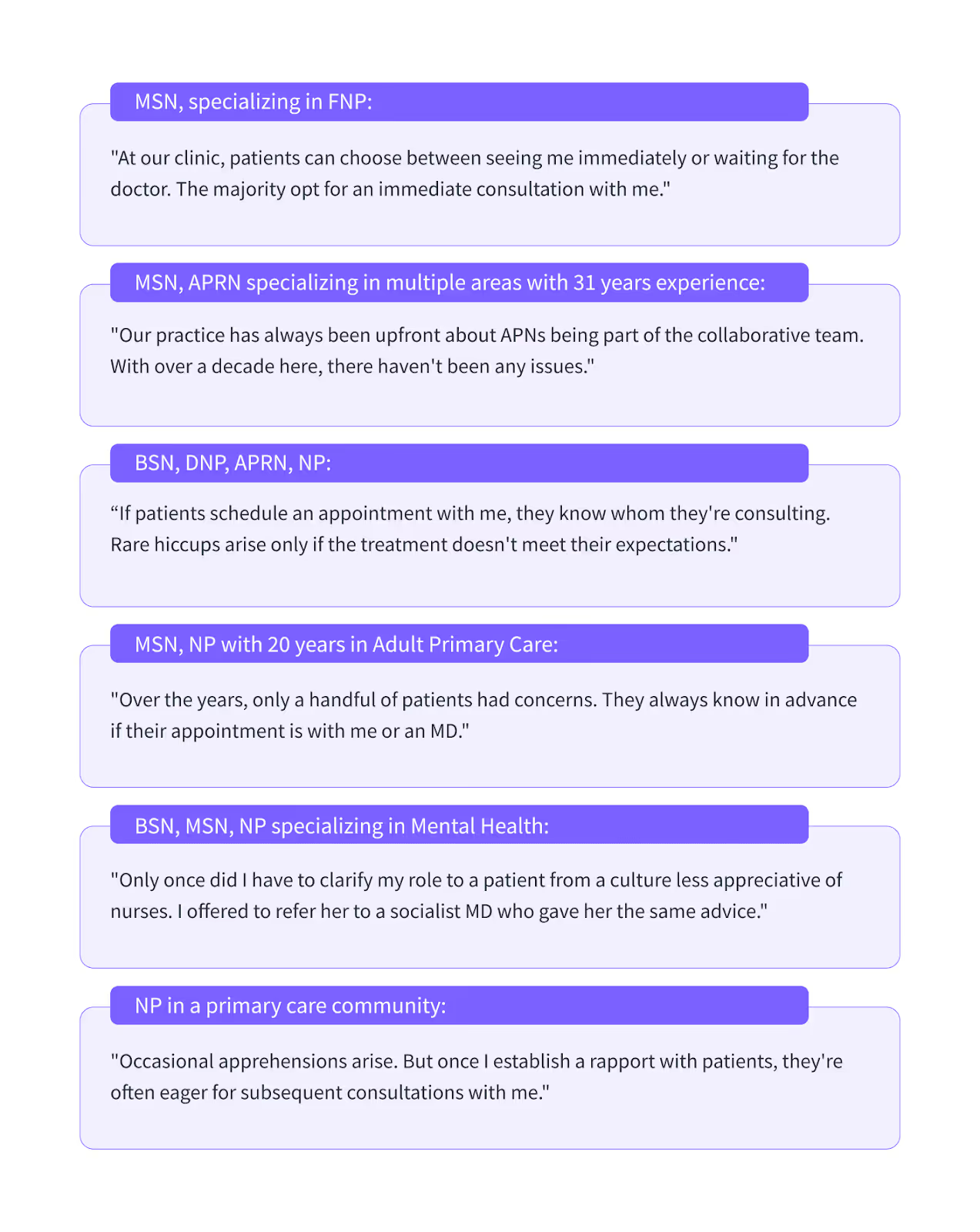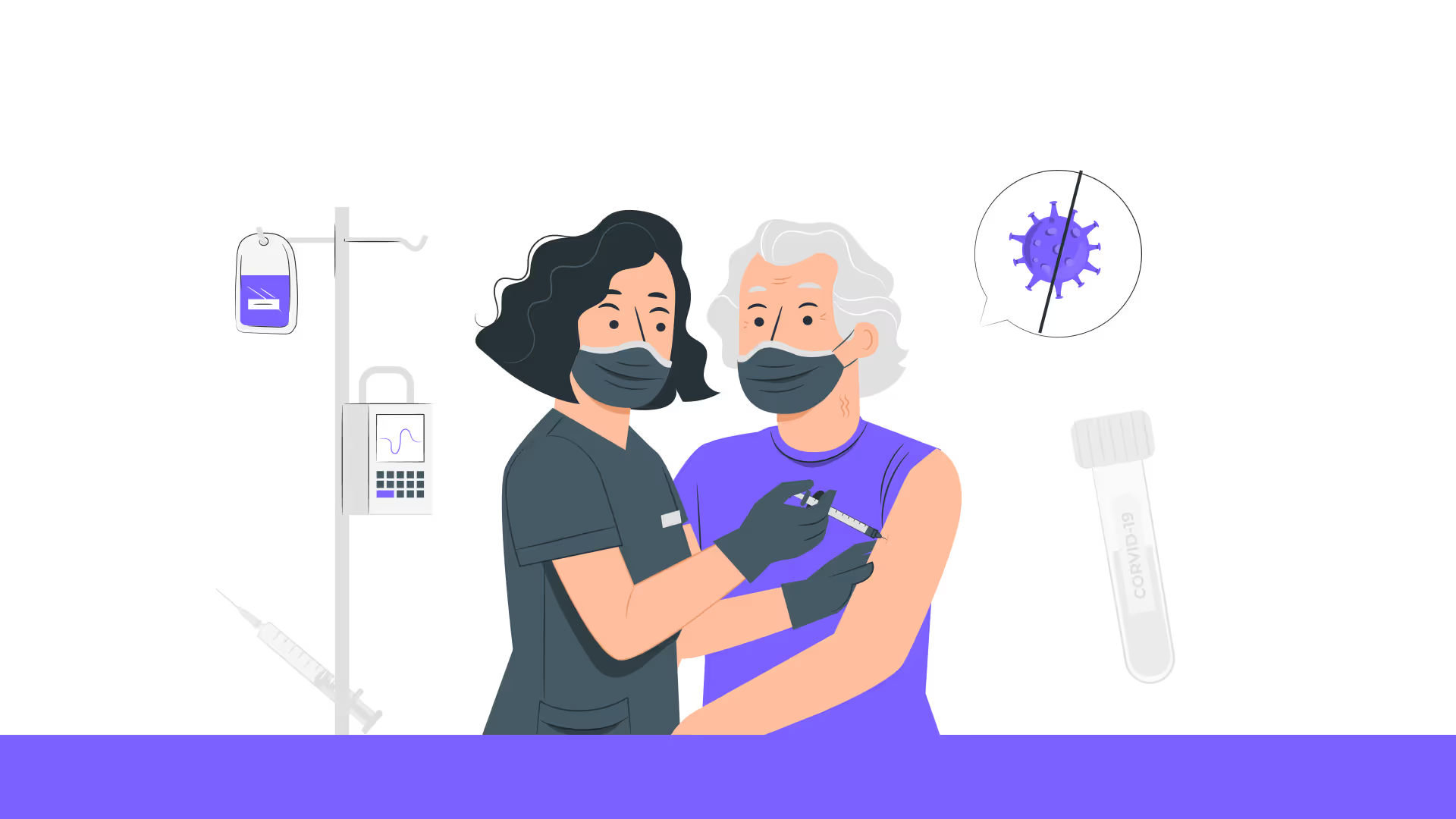All Nurse Practitioners (NPs) are a subset of advanced practice nurses (APRNs) who step into their roles with dedication and a comprehensive skill set.
Their expertise stems from rigorous nursing education, clinical training, and a commitment to delivering quality healthcare.
NPs often start their careers as registered nurses (RNs) before advancing their education to become NPs. They have completed at least a master’s degree in nursing to qualify for their roles, with many pursuing additional advanced degrees like the Doctor of Nursing Practice (DNP) to enhance their scope of practice within their nursing specialty.
These graduate degrees ensure NPs are equipped to manage patient care comprehensively, from diagnosing conditions to prescribing medications.
But what if a patient, unfamiliar with the nurse practitioner profession, is unsure about consulting with you? How do you address the hesitation?
This blog delves into understanding these doubts, providing insights from nurse practitioner professionals, and offering communication strategies to ensure you and your patient feel comfortable and confident in the care provided.
First thing first ... why are some patients unsure about Nurse Practitioners?
Despite the critical role NPs play in healthcare, some patients approach their care with preconceived notions or doubts.
These often stem from a lack of understanding about the qualifications, scope of practice, and capabilities of Nurse Practitioners. NPs have completed a graduate degree in nursing, which equips them with advanced skills and knowledge necessary for their roles.
A common misconception is that NPs provide a lower level of care compared to physicians. However, research consistently shows that NPs deliver care of equal quality, often excelling in patient satisfaction and holistic treatment approaches.
As we all know, in some states, NPs have full practice authority, allowing them to practice independently and prescribe medications without supervision, further demonstrating their advanced capabilities.
Also, specializations such as Family Nurse Practitioners (FNPs), Pediatric Nurse Practitioners (PNPs), and Clinical Nurse Specialists (CNSs) highlight the diverse expertise NPs bring to healthcare. Each specialty requires advanced training, clinical hours, and a deep understanding of the patient populations they serve.
Building patient trust through your expertise
As a nurse practitioner (NP), you’ve invested years in advanced training, clinical hours, and direct patient care. But despite your deep expertise, some patients may hesitate to trust your role in their healthcare journey.
This doubt often stems from unfamiliarity with the scope of practice NPs offer, even though NPs have been providing high-quality care across nursing specialties for decades.
When patients express concerns, it’s not about questioning your skills—it’s an opportunity to educate, reassure, and connect. By addressing their doubts with empathy, you can help them understand how NPs deliver exceptional, patient-centered care:
Introduce your role effectively as an NP
First impressions matter, especially when meeting a patient who may be unsure about working with a Nurse Practitioner (NP).
Your introduction is your opportunity to set the tone, establish trust, and highlight the value you bring to their care. Here’s how to approach it effectively:
- Start with a patient-first focus: Begin the interaction by focusing on the patient’s concerns or goals for the visit. For example: “What brings you in today?” or “How can I help you feel better?”
- Introduce your professional title naturally: Rather than leading with technical terms, explain your role in simple, patient-friendly language.
- Highlight your advanced training in context: Patients may not understand the depth of your education, but you can incorporate it seamlessly into the conversation. Mention that you hold a Doctor of Nursing Practice (DNP) degree, a terminal nursing practice degree that emphasizes advanced clinical practice and healthcare leadership.
- Invite engagement: Encourage patients to express any questions or concerns: “Do you have any questions about my role or how I’ll be working with you today?” This not only shows transparency but also opens the door to addressing misconceptions or hesitations directly.
Debunk common misconceptions about NPs
Patient hesitation often stems from lingering misconceptions about Nurse Practitioners (NPs). While you already know the depth of your expertise, addressing these misunderstandings with patients can help them feel more confident in your care. Here’s how to reframe common myths with empathy and clarity:
“NPs aren’t as qualified as physicians”
Patients may not realize the unique strengths that come with an NP’s training. Rather than comparing roles, emphasize your qualifications.
“I don’t see NPs prescribing medication or treating complex conditions”
If patients raise this concern, it’s a chance to educate them on your scope of practice. Explain that in many states, NPs have full practice authority, meaning you can prescribe medications (including controlled substances) and manage conditions independently.
“NPs only handle minor health issues”
This misconception can make patients underestimate the breadth of your skills. Counter it by sharing your experience in managing complex cases:
- For example, Certified Registered Nurse Anesthetists (CRNAs) manage anesthesia in high-stakes surgical settings, and Family Nurse Practitioners (FNPs) oversee care for multigenerational families.
- Explain that NPs are often trained in advanced procedures and diagnostics, enabling them to handle intricate medical needs with confidence.
“NPs are just substitutes for doctors”
This myth undervalues the holistic approach NPs bring to patient care. Rather than seeing yourself as a “replacement,” position yourself as a partner in their healthcare:
- Highlight the personalized attention you provide, focusing on prevention, wellness, and education.
- Reassure them that when necessary, you collaborate with physicians and other specialists, ensuring they have a team dedicated to their well-being.
- The goal isn’t to defend your role—it’s to show patients the added value of having an NP on their side.
By addressing these misconceptions thoughtfully, you can help patients understand and appreciate the depth of your expertise.
Ultimately, these conversations build trust and create stronger, more collaborative patient relationships.
Reframing your expertise for patients
Rather than focusing solely on your credentials, demonstrate how your advanced training and full practice authority translate into better care for them:
- More time and attention: Highlight your ability to spend meaningful time with patients, listening to their concerns and tailoring care to their unique needs. This is often a primary difference patients notice between NPs and other providers.
- Holistic care that empowers patients: Explain how you go beyond treating symptoms by educating patients about preventive care and healthy lifestyles. Your role includes prescribing medications, performing medical procedures, and guiding them toward long-term wellness.
- Collaborative care for comprehensive treatment: Reassure patients that while you practice independently in many states, you also work seamlessly with physicians and other healthcare professionals when needed, ensuring they receive the best possible care.
Mastering the Art of Communication in a Nursing Career
Communication is a cornerstone of nursing practice, particularly for Nurse Practitioners (NPs) and Doctor of Nursing Practice (DNP) professionals, who have completed a nursing degree as part of their educational journey.
Mastering this skill involves more than just delivering information—it requires empathy, active listening, and an ability to address patient concerns effectively.
Many NPs and DNPs report that open communication significantly improves patient trust and satisfaction. By explaining their qualifications, experience, and the rationale behind medical decisions, these professionals can alleviate doubts and build stronger relationships. For example, a family nurse practitioner (FNP) often provides care across a range of settings, delivering healthcare to individuals and families of all ages.
Simple techniques, like summarizing patient concerns or encouraging questions, can make a significant difference in patient perceptions.
This art of communication also extends to interdisciplinary collaboration. NPs and DNPs often work alongside physicians, specialists, and other healthcare professionals, ensuring comprehensive care. Clear, concise communication within the healthcare team enhances efficiency and improves patient outcomes.

How to address patient doubts as a nurse practitioners?
Patient skepticism about nurse practitioners is often rooted in misunderstanding or a lack of familiarity with the role. Many are unaware of the various specializations within the NP role, such as a certified registered nurse anesthetist, which require advanced training and certification.
As an NP, addressing these doubts isn’t just about correcting misconceptions—it’s about building trust and confidence through compassionate communication. Here are practical ways to approach these conversations with empathy and professionalism:
Educate your patients
Patients may not fully understand the rigorous training and clinical hours that go into becoming an NP. Use this as an opportunity to explain your qualifications, certifications, and scope of practice. A quick but confident breakdown of your expertise can go a long way in easing concerns.
Focus on building rapport
Trust starts with listening. When patients feel heard and valued, their doubts naturally begin to dissipate. Take the time to acknowledge their concerns and provide thoughtful, transparent responses. A warm, approachable demeanor can make all the difference.
Offer collaboration when needed
If a patient still feels uncertain, suggest collaborating with a physician on their case. This team-based approach not only reinforces the quality of care but also shows your commitment to meeting their needs without compromising their comfort.
Let success stories speak for you
There’s nothing more persuasive than real-world results. Share examples of positive outcomes from your practice or testimonials from other patients who’ve benefited from your care. These stories can reassure hesitant patients and give them confidence in your abilities.
Remember: The key is to combine empathy with education. Patients may not always understand the depth of an NP’s role, but your ability to connect, listen, and provide exceptional care will always speak louder than words.
Why patient trust matters?
Patients are more likely to engage with and adhere to care plans when they trust their provider.
Your background as an advanced practice registered nurse (APRN) uniquely equips you to bridge gaps in understanding.
By demonstrating your expertise in direct patient care and emphasizing your advanced training in nursing science and evidence-based practice, you can strengthen their confidence in your care.
Your role as a nurse practitioner goes beyond clinical hours or a professional title—it’s about delivering quality care with compassion and leadership. Building trust isn’t just part of the job; it’s the foundation of a successful nursing career.
What Do Nurse Practitioners with Full Practice Authority Say?
For Nurse Practitioners with full practice authority, patient doubts are a familiar hurdle—but one they’ve learned to navigate effectively.
Whether it’s addressing misunderstandings about their scope of practice or clarifying their role in the healthcare team, experienced NPs have developed strategies to earn patient trust and build strong, lasting relationships.
The insights below, shared by NPs across various specialties, highlight their real-world approaches to overcoming patient hesitations:

These reflections offer a wealth of lessons. First, accessibility and transparency are powerful tools. Patients value clarity about who they’re consulting, whether it's through scheduling systems that clearly list providers or open communication during their first interaction.
When patients know what to expect, they’re less likely to feel uncertain about the care they’ll receive.
Second, cultural sensitivity and flexibility matter. One NP’s experience of referring a hesitant patient to a physician demonstrates how being understanding, rather than defensive, can build trust—even if it means taking an indirect route.
Showing empathy for a patient’s background or belief system can turn a skeptical patient into an advocate for your care in the long run.
Finally, these insights remind us of the importance of building rapport over time. While a few patients may express initial doubts, consistent care, clear communication, and strong patient outcomes will often turn hesitation into loyalty.
Patients aren’t just evaluating your credentials—they’re evaluating how well you listen, understand, and collaborate to meet their unique needs.
The message from NPs with full practice authority is clear: trust isn’t built overnight, but every interaction is an opportunity to solidify your value in your patients’ eyes.
Embracing patient concerns as opportunities
Patient doubts aren’t just hurdles—they’re opportunities to strengthen your skills, deepen your connections, and showcase the unique value Nurse Practitioners bring to healthcare.
These moments of hesitation allow you to educate, reassure, and build trust in ways that can leave a lasting impression.
Remember, these conversations aren’t about defending your role—they’re about sharing it.
Every question a patient asks, every moment of doubt, is a chance to help them understand the rigorous training, clinical hours, and dedication that brought you to this point in your career. It’s also a chance to show them the personalized, compassionate care that defines you as an NP.
When you approach these situations with empathy and confidence, you not only earn your patients’ trust but also help elevate the entire profession.
By addressing concerns with grace, you reinforce the credibility of Nurse Practitioners everywhere, paving the way for future NPs to thrive in their roles.
Patient skepticism is normal, but it’s also a testament to how meaningful your work is. Each interaction is an opportunity to not only care for patients but also to teach them about the incredible work NPs do. Over time, these small efforts lead to big changes in how patients view and trust Nurse Practitioners.
Conclusion
By understanding the root of patient doubts, Nurse Practitioners can employ empathetic communication to reshape perceptions. Whether addressing misconceptions about their ability to prescribe medication or demonstrating the depth of their training, NPs and DNPs play a vital role in modern healthcare.
Through advanced training, collaborative care, and a patient-centered approach, NPs ensure that every patient receives comprehensive and compassionate treatment. As the profession continues to grow, so does the opportunity to redefine healthcare—one patient interaction at a time.
Frequently Asked Questions (FAQs)
Why might a patient be unsure about seeing an NP? Patients might have doubts due to cultural beliefs or a lack of understanding about the qualifications and roles of Nurse Practitioners.
Can a Nurse Practitioner replace a Physician? While NPs have extensive training and can diagnose, treat, and prescribe medications like physicians, they complement—not replace—the healthcare team, often collaborating with physicians on complex cases.
What should I do if a patient questions my skills as an NP? Stay calm and professional. Explain your qualifications, experience, and scope of practice. Offering to collaborate with a physician or providing references can also build trust.
Are there strategies to proactively address patient concerns? Educating patients about the role of NPs, maintaining transparent communication, and building rapport over time are key strategies to develop trust and ease concerns.
Find a preceptor who cares with NPHub
Book a rotation.webp)








.webp)


.webp)



.webp)